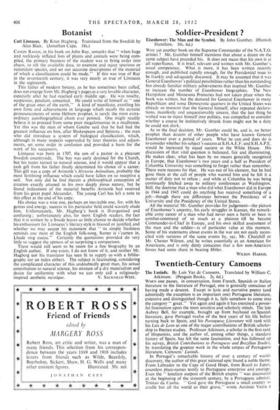Botanist
CANON RAVEN, in his book on John Ray, remarks that" when huge and recklessly inflated lists of plants and animals were being com- piled, the primary business of the student was to bring order into chaos, to sift the available data, to examine and reject spurious or redundant species, and set out accurate descriptions of the material of which a classification could be made." If this was true of Ray in the seventeenth century, it was very nearly as true of Linnaeus in the eighteenth. This father of modern botany, as he has sometimes been called; does not emerge from Mr. Hagberg's pages as a very lovable character, especially after he had reached early middle age. He was touchy, suspicious, petulant, conceited. He could write of himself as " one of the great ones of the earth." A kind of manifesto, extolling his own fame and achievements in language which recalls the ecstatic pronouncements of some Hebrew prophet, is surely the most extra- ordinary autobiographical chant ever penned. One might readily believe it to proceed from some poor megalomaniac in a madhouse. Yet this was the man of whom Goethe said that he had had the greatest influence on him, after Shakespeare and Spinoza ; the man who did introduce a system of biological classification, which, although in many respects superseded by later theories and adjust- ments, set some order in confusion and provided a basis for the work of his successors.
Linnaeus was born in 1707, the son of a pastor in a pleasant Swedish countryside. The boy was early destined for the Church, but his tastes turned to natural science, and it would appear that a rash gift from his father finally determined his choice of a career. This gift was a copy of Aristotle's Historia Animalium, probably the most fertilising influence which could have fallen on so receptive a soil. Not only did he find therein a philosophical conception of creation exactly attuned to his own deeply pious nature, but he found indications of the material benefits Aristotle had received from his great pupil Alexander. The young Carl has left a note to this effect at the end of his copy.
His choice was a wise one, perhaps an inevitable one, for, with his genius and energy, success in his particular field could scarcely elude him. Unfortunately, Mr. Hagberg's book is ill-organised and confusing ; unfortunately also, for most English readers, the fact that it is written by a Swede leaves us little chance to decide-whether his enthusiasm for Linnaeus's literary style is biassed or justified, and whether we may accept his statement that " its simple freshness reminds one most of the English folk-song, Sumer is i'cumen in, Lhude sing cuccu." Certainly the quotations provided do very little to suggest the aptness of so surprising a comparison.
There would still seem to be room for a fine biography by an English author. If one exists, I do not know of it, and neither Mr. Hagberg uor his translator has seen fit to supply us with a biblio- graphy (or an index either). The subject is fascinating, considering the complicated character of this undoubtedly great man, his actual contribution to natural science, his mixture of a dry materialism and desire for uniformity with what we can only call a religiously-


































 Previous page
Previous page